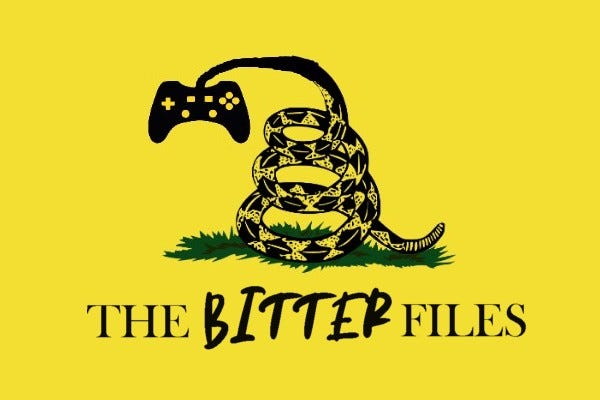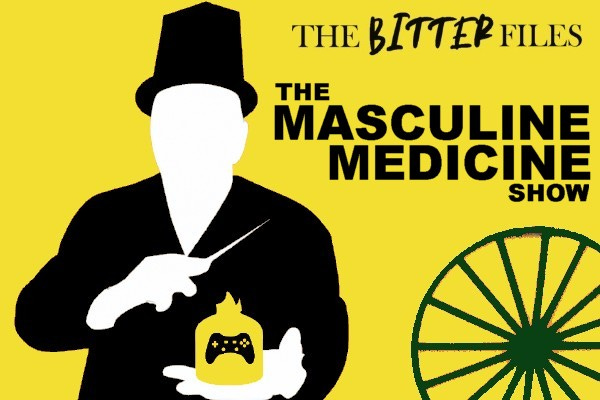The Masculine Medicine Show
The Bitter Files episode 2: The predatory market selling masculinity to geeks
This is the second episode of a monthly feature for paid subscribers titled The Bitter Files - excerpts from a book I wrote but never finished.
Read here for more information
Episode 1 - What Is a Geek?
👉Episode 2 - The Masculine Medicine Show
Episode 3 - The Red Pill
Episode 4 - Reactionaries and Apostates
In Paul Thomas Anderson’s film Magnolia, a dark stage lights up to the tune of Strauss’ Also Sprach Zarathustra. Frank T. J. Mackie, played by Tom Cruise in a muscle shirt and leather vest, emerges backlit from the shadows to riotous applause. When the cheers die down, Mackie triumphantly gestures toward his crotch.
“Respect the cock,” he tells the audience, and after a pause, “And tame the cunt!”
Given the spectacular entrance, Anderson gives us the impression that Mackie is performing to a packed stadium or concert hall. But when the camera switches to the audience, we see that we’re in a hired conference room with around two dozen doughy, middle-aged men.
Magnolia was released in 1999, but Anderson pre-empted by around five years a group of subcultures that would come to be unironically known as the “manosphere.” This is a loose umbrella that roughly lumps together a variety of subcultures geared toward men and the reaffirmation and galvanization of traditional masculinity and gender roles.
There are so many distinct groups associated with this term “manosphere” that it’s actually easier to group them by what they exist to oppose—that is, feminism. In that sense, the common thread connecting all of the manosphere groups together is antifeminism and their differences can be expressed as how they perform antifeminism. “Men’s rights” activism, the “Go Your Own Way” movement, fraternities, and even so-called incels (involuntary celibates) can be considered manosphere ideologies. They can roughly be subdivided into those groups that are reactively antifeminist, or acting in defense of patriarchal structure that they fear is under attack, and those that are proactively antifeminist, for whom attacking feminism and reinforcing and furthering patriarchy is a lifestyle. Nobody does proactive antifeminism as flamboyantly and obnoxiously as the so-called “pickup artists.”
This community certainly existed to some degree before 1999 (Anderson claims he modelled his character on the seminars of Ross Jeffries)1 but it didn’t really hit the mainstream consciousness until 2005 when journalist Neil Strauss wrote the New York Times bestselling book The Game: Penetrating the Secret Society of Pickup Artists.
Pickup artistry, also known as PUA or the seduction community, is a community of like-minded men who learn and share various techniques for figuring out how to hack into the mysterious, un-knowable female brain. And it should go without saying that it’s not marketed to confident and socially experienced men. And I say “men” because they are, almost exclusively, the target market. (There is at least one self-styled PUA, Arden Leigh, who advises women on seducing men, but she’s considered kind of a novelty case, and many male PUAs outwardly despise her. The few other women in the seduction community, like Kezia Noble, still market their schtick to men.)
PUAs make their money selling books and holding seminars that instruct men on how to approach women—generally in bars, but also in other environments such as bookstores or just on the street—using techniques that they claim will result in a better than random chance of said men experiencing some kind of sexual contact, whether it’s a kiss, a date, or intercourse.
When I was a teenager, I took a couple of professional classes on how to play pool. That was over a decade ago, and I’ve forgotten everything I learned, but it’s a pretty good analogy for how PUA is at least purported to work. Pool is not a “solved game” – nobody can tell you exactly how to win in the way that they can tell you how to solve a puzzle or a maze. But it is a game of physics, balls bouncing around a table in determinable cause-and-effect patterns, so it’s possible to get good at pool by developing a better sense of where to strike the ball.
PUA might try to present itself as sociological, but its view of the world never approaches the complexity of sociology. Sociological interactions are interactions between people. In the mindset of PUA, the problem is physics. The student is the guy with the rigid stick, but women aren’t the opposing players. They’re the billiard balls bouncing around the table.
There’s no coincidence in the fact that the set of “skills” that PUAs teach is collectively referred to as “Game.”
After the jump: The geek connection, seduction as a video game, medicine shows and the industry of false promises. Upgrade to a paid subscription to read the rest of this and all the other episodes of The Bitter Files.
Keep reading with a 7-day free trial
Subscribe to Plato Was a Dick to keep reading this post and get 7 days of free access to the full post archives.






